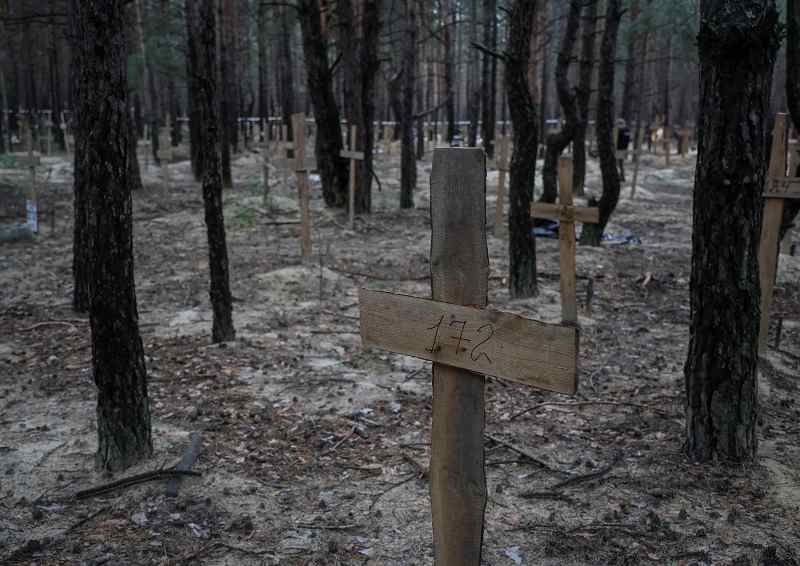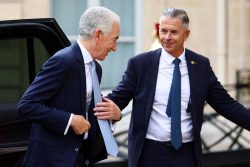
Crosses with numbers are seen at a place of mass burial, as Russia’s attack on Ukraine continues, in the town of Izium, recently liberated by Ukrainian Armed Forces, in Kharkiv region, Ukraine, on Friday.
11:16 JST, September 17, 2022
KYIV/IZIUM, Ukraine (Reuters) – Ukrainian officials said on Friday they had found hundreds of bodies, some with their hands tied behind their backs, buried in territory recaptured from Russian forces, in what President Volodymyr Zelenskyy called proof of war crimes by the invaders.
Zelenskiy told Reuters in an interview many corpses were also interred in other sites in the northeast and appealed for foreign powers to step up weapons supplies, saying the outcome of the war hinged on their swift delivery.
“As of today, there are 450 dead people, buried. But there are others, separate burials of many people. Tortured people. Entire families in certain territories,” Zelenskyy said in his presidential office on Friday.
The head of the pro-Russian administration which abandoned the area last week accused Ukrainians of staging the atrocities at the city of Izium. “I have not heard anything about burials,” Vitaly Ganchev told Rossiya-24 state television.
Ukraine’s Foreign Minister Dmytro Kuleba urged the West to ramp up weapon deliveries. “One can only imagine the hell that people in other Russia-occupied territories still go through. We urgently need more weapons to liberate them and save their lives!” he wrote on Twitter.
Outside Izium on Friday, officials wearing masks and protective suits were digging out bodies at the site in a forest where around 200 makeshift wooden crosses were planted among trees.
“We are at the site of the mass burial of people, civilians who were buried here, and now according to our information they all have the signs of violent death,” Kharkiv Gov. Oleh Synehubov said at the site.
“There are bodies with hands tied behind [their backs]. Each fact will be investigated and will be properly and legally evaluated,” Synehubov said.
Officials laid the exhumed bodies out in white body bags. Some were wrapped in rags. One was in military fatigues.
In a separate video address on Izium, Zelenskiy said authorities had found a mass grave containing the bodies of 17 soldiers, some of which bore signs of torture.
If the number of bodies is confirmed, the site in Izium, a former Russian front-line stronghold, would be the biggest mass burial found in Europe since the aftermath of the 1990s Balkan wars.
U.S Secretary of State Antony Blinken wrote on Twitter that the reports from Izium were “heartbreaking and should galvanize our support to the brave Ukrainians seeking to liberate their homeland.”
White House national security spokesman John Kirby called the accounts “horrifying.”
Russian President Vladimir Putin did not immediately respond to the accusations, but brushed off Ukraine’s lightning counter-offensive and warned that Moscow would respond more forcefully if its troops were put under further pressure.
Speaking after a summit of the Shanghai Cooperation Organization in the Uzbek city of Samarkand, Putin cast the invasion as a necessary step to prevent what he said was a Western plot to break Russia apart.
“The Kyiv authorities announced that they have launched and are conducting an active counter-offensive operation. Well, let’s see how it develops, how it ends up,” Putin said with a grin.
Russia regularly denies targeting civilians during what it calls its “special military operation” in Ukraine and has said in the past that accusations of human rights abuses are a smear campaign.
In Kupiansk, a northeastern railway junction city whose partial capture by Kyiv’s forces on Saturday cut Russia’s supply lines and led to the swift collapse at the front, small units of Ukrainian troops were securing a nearly deserted ghost town.
A formerly Russian-occupied police station had been hastily abandoned. Russian flags and a portrait of Putin lay on the floor amid broken glass. Records had been torched. Behind the steel doors of the station’s jail cells there was blood on the floor and stains on the mattresses.
Three piglets on the loose from an abandoned sty were foraging in a city street. Serhiy, a middle-aged man in a thin jacket, was hungry for news.
“There’s no electricity, no phones. If there were electricity, at least we could have watched TV. If there were phones, we could have called our relatives,” he said.
After a week of rapid gains in the northeast, Ukrainian officials have sought to dampen expectations that they could continue to advance at that pace. They say Russian troops who fled the Kharkiv region are now digging in and planning to defend territory in neighboring Luhansk and Donetsk provinces.
“It is of course extremely encouraging to see that Ukrainian armed forces have been able to take back territory and also strike behind Russian lines,” NATO Secretary General Jens Stoltenberg told BBC radio.
“At the same time, we need to understand that this is not the beginning of the end of the war. We need to be prepared for the long haul.”
Ukraine has also launched a major offensive to recapture territory in the south, where it aims to trap thousands of Russian troops cut off from supplies on the west bank of the Dnipro river, and retake Kherson, the only large Ukrainian city Russia has captured intact since the start of the war.
Russia’s state-run RIA news agency released video showing smoke billowing from Kherson’s Russian-occupied administration building after apparent Ukrainian rocket attacks that it said had killed three people and wounded 13.
In the east, the chief prosecutor of the pro-Russian separatist administration in Luhansk was killed by an explosion in his office, along with his deputy, according to Russian news agencies. Pro-Russian authorities said a husband and wife working to arrange a referendum on joining the southern city of Berdiansk to Russia had also been killed overnight.
Russia also reported strikes across the border in its Belgorod region.
Top Articles in News Services
-

Survey Shows False Election Info Perceived as True
-

Hong Kong Ex-Publisher Jimmy Lai’s Sentence Raises International Outcry as China Defends It
-

Japan’s Nikkei Stock Average Touches 58,000 as Yen, Jgbs Rally on Election Fallout (UPDATE 1)
-

Japan’s Nikkei Stock Average Falls as US-Iran Tensions Unsettle Investors (UPDATE 1)
-

Trump Names Former Federal Reserve Governor Warsh as the Next Fed Chair, Replacing Powell
JN ACCESS RANKING
-

Producer Behind Pop Group XG Arrested for Cocaine Possession
-

Japan PM Takaichi’s Cabinet Resigns en Masse
-

Japan Institute to Use Domestic Commercial Optical Lattice Clock to Set Japan Standard Time
-

Man Infected with Measles Reportedly Dined at Restaurant in Tokyo Station
-

Israeli Ambassador to Japan Speaks about Japan’s Role in the Reconstruction of Gaza





















